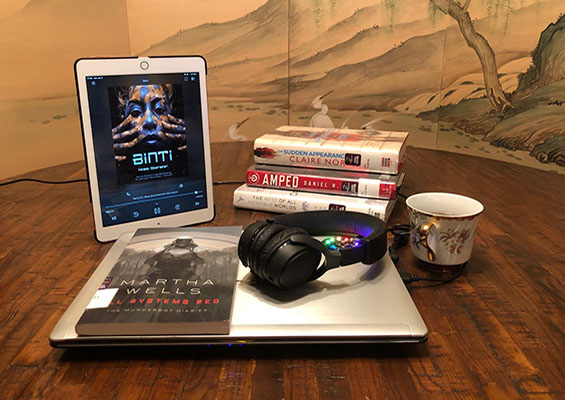 IT pros know that part of today’s cybersecurity toolkit is understanding people and how they interact with – and through – technology. Science fiction is another tool to gain more insight into other ways of thinking about identity today and tomorrow. Fortunately, the last decade of identity-focused science fiction is more accessible and inclusive than ever before.
IT pros know that part of today’s cybersecurity toolkit is understanding people and how they interact with – and through – technology. Science fiction is another tool to gain more insight into other ways of thinking about identity today and tomorrow. Fortunately, the last decade of identity-focused science fiction is more accessible and inclusive than ever before.
So, for IT pros in a variety of job roles, others working in the tech sector and aspiring professionals, the following novels and novellas are just a few of the many about identity – and each book includes at least one adventure and some chaos. This list includes books with more hope than is typical in dystopian fiction, and the tone of these echoes the 1969 Philip K. Dick novel Ubik, so happy reading (or listening, if you prefer audiobooks).
A Security Nightmare With a Smile You’ll Forget
The Sudden Appearance of Hope (2016) by Claire North
Claire North is a pen name for Catherine Webb, a lifelong Londoner who published as a teenager under her own name. Now in her thirties, she’s continued writing (and winning awards) while also working as a technical lighting designer.
Many popular physical security protocols could be broken by someone who no one can remember. Hope is that someone. Her own identity has become fluid. She slides through new names and personas using familiar technology (such as the Tor browser) and social engineering techniques. Hope just might be a cybersecurity nightmare with a smile that can’t be remembered, unless you stare at a photo.
In The Sudden Appearance of Hope, she’s living in a near-future where an app called Perfection is what “just everyone” is using. Adding to the realism and pacing, Hope functions under stress by listing facts, counting and imagining disappearing into her surroundings. Whether she’s just an international jewel thief with bad language and worse behavior, or she’s an avenger, the story is Hope’s.
Pattern-based Thinking to Solve Interplanetary Conflict
Binti (2015) by Nnedi Okorafor
Nnedi Okorafor is a Nigerian-American author who won both Hugo and Nebula awards for best novella for Binti, the first in a series.
A basic insight and pattern recognition can keep a lot of problems from getting worse – even interplanetary ones. This shorter book delivers intense storytelling, familiar Afrofuturist world building and authentic vocabulary in a compact format.
Binti is a young woman from a futurized Himba people, a current minority in Namibia. The novel kicks off with her thoughts and observations while she powers up a dodgy transporter.
As Binti leaves her home culture and family to travel to an off-planet university, the unforeseen occurs. As IT pros may know best, incident response can be about doing the best you can in a bad situation.
More Book Recs
Looking for more books related to technology and IT careers? Check out these:
Pretending to Be a Robot on a Routine Security Contract
All Systems Red (2017) by Martha Wells
Martha Wells is a prolific author from Texas who started winning major writing awards in the 1990s. Her 2017 novella, All Systems Red, is the first in The Murderbot Diairies, and she’s won both Hugo and Nebula awards for it.
All Systems Red hinges on what’s hidden and what’s been compromised, much like CompTIA Cybersecurity Analyst (CySA+) and CompTIA PenTest+. There’s danger and a question of data integrity, and a character even asks a question like, “Is it possible for someone to hack [fill in the blank]?” As cybersecurity pros may know best, the default answer is “Yes.”
The book is written as the diary of a self-named Murderbot, who is a cyborg-like security unit under contract to protect a group of scientists, but it would rather be watching serial dramas. The current planetary expedition seems pleasantly routine, until it’s not. Look for social engineering skills from a Murderbot (and some high-level hacking references). Sometimes being known isn’t the biggest risk.
An Expedition to Fix a Social Problem
The Best of All Possible Worlds (2013) by Karen Lord
Karen Lord is a Barbadian writer with a science degree and a Ph.D. in the sociology of religion. After the Indian Ocean tsunami on December 26, 2004, surviving Sri Lankan fishermen who lost their wives and children spoke candidly about trying to rebuild their society. Reading that news, Lord imagined the Caribbean becoming a whole planet that welcomes communities of interplanetary refugees.
In her book, interplanetary refugees from Sadiri organize a sociological expedition and DNA testing to help locate potential spouses. Much like a series of short Star Trek episodes, each meeting with another community teaches the expedition team more about themselves (while a lot goes wrong).
The Best of All Possible Worlds explores risks and human vulnerabilities. It’s also both a possible love story and a project manager’s nightmare.
We Are the Devices: Internet of Things (IoT) With AI Impact
Amped (2012) by Daniel H. Wilson
Daniel H. Wilson is a Cherokee citizen and the famous author of Robopocalypse and other books. He has a Ph.D. in robotics and a master’s degrees in both artificial intelligence (AI) and robotics.
Amped is for when you’d like a long novel with pulse-pounding adventure, robotics, AI and history, and your content filters aren’t on their most sensitive settings.
It’s a near-future techno thriller where there’s xenophobic backlash against anyone who has a neural implant. Wilson extrapolates on social and personal identity issues related to human augmentation with AI and robotics.
The novel is told from the perspective of Owen, who has a neural implant, and it begins with a product pamphlet and legal excerpts. Owen ignored the signs that society was turning against anyone with a neural implant. However, he has access to some really cool tech, so what will happen may depend on just who he decides to be.
Future Organized Crime Sells Chocolate Bars
All These Things I’ve Done (2011) by Gabrielle Zevin
Gabrielle Zevin is an American author who lives in Los Angeles. All These Things I’ve Done is considered a young adult romance with a near-future setting and was listed in multiple magazines and reading lists soon after it was first published in 2011.
In 2083, chocolate and all forms of caffeine are illegal and controlled by organized crime. This future version of New York strictly regulates everyday life, including requiring postage for email.
A teenage girl named Anya balances the politics of her Russian-American organized crime family while trying to protect them, whether they need or want her help: her dying grandmother, her sister, who is intellectually gifted, and her brother, who has a traumatic brain injury. That’s all while she faces the consequences of a murder charge or two while trying to avoid being expelled from Catholic school.
This first installment of a multi-book series provides a sweeping overview of fictionalized distribution networks, politics and organized crime without completely shocking most adults or older teens. Given different motives of threat actors, such as organized crime syndicates, this inside look of fictionalized crime may inspire cybersecurity professionals and some of their family members. For readers willing to ignore inconsistencies, some of the topics in this book could be a launching point for talking about physical security, trust and other security topics.
What’s on your reading list? Let us know in the comments.
Leila Woolheater is an Assurance Guru with a software as a service (SaaS) provider and helps with quality assurance, development, documentation and more. Leila holds CompTIA IT Fundamentals+, CompTIA Security+, CompTIA Cybsersecurity Analyst (CySA+) and CompTIA Project+.




0